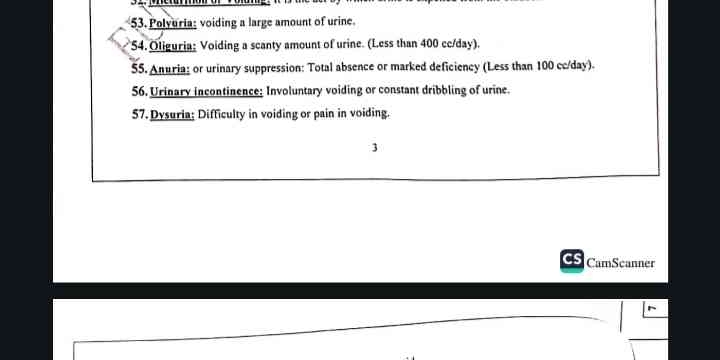What are the definitions of polyuria, oliguria, anuria, urinary incontinence, and dysuria?

Understand the Problem
The question appears to be asking about medical terminology related to urination, specifically definitions of various conditions. It lists terms such as polyuria, oliguria, and others, along with their meanings.
Answer
Polyuria: large urine volume. Oliguria: scant urine output. Anuria: no urine output. Urinary incontinence: involuntary leakage. Dysuria: painful urination.
Polyuria: large urine volume. Oliguria: scant urine output (less than 400 mL/day). Anuria: absence or marked deficiency of urine (less than 100 mL/day). Urinary incontinence: involuntary urine leakage. Dysuria: pain or difficulty in urination.
Answer for screen readers
Polyuria: large urine volume. Oliguria: scant urine output (less than 400 mL/day). Anuria: absence or marked deficiency of urine (less than 100 mL/day). Urinary incontinence: involuntary urine leakage. Dysuria: pain or difficulty in urination.
More Information
These conditions are often related to various medical issues such as diabetes, kidney disease, or urinary tract infections.
Tips
A common mistake is confusing polyuria and oliguria due to their prefixes. Remember 'poly' means 'many' and 'oli' suggests 'few' or 'scant'.
Sources
- Anuria: Causes, Symptoms, Diagnosis & Treatment - Cleveland Clinic - my.clevelandclinic.org
- Urinary System – Medical Terminology for Healthcare Professions - pressbooks.uwf.edu
- Chapter 16 Elimination - Nursing Fundamentals - NCBI Bookshelf - ncbi.nlm.nih.gov
AI-generated content may contain errors. Please verify critical information